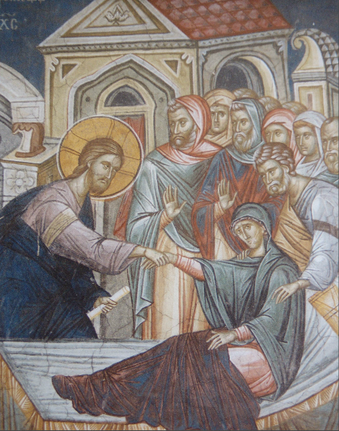 Leviticus 13:1-2, 44-46 Mark 1:40-45 ‘Feeling sorry for him, Jesus stretched out his hand and touched him. ‘Of course I want to!’ he said. ‘Be cured!’ (Mark 1:33-34a) The gospel presents us with a miraculous healing which ends up spreading Jesus’ fame as a healer and wonderworker to such a great degree that by the end of it people from far and wide come to seek the Lord’s help wherever he went (Cf. Mark 1:45). And out of this short story there are two key elements I would like to look at with you. First, let us look at the leper himself. We read that a nameless man suffering from leprosy (or more likely by an unidentified skin condition) approaches Jesus to ‘plead on his knees’ (Mark 1:40). He does not profess faith in Jesus in any explicit way, but his posture before the Lord gives away what he actually believes; in Biblical time, and perhaps even today, kneeling and/or bowing down was a manifestation of “worship”. This man somehow knows and believes that he is standing before the Son of God. And in him we see a person who comes to Jesus asking for healing with confidence about the Lord’s power and faith in him. St Mark doesn’t give us his name so that each of us could picture him or herself in his place, kneeling, pleading before Jesus; ‘If you want, you can cure me.’ Then, we should look at the issue of ritual purity. Last week’s gospel showed us how Jesus healed those who sought his help under the cover of night – probably because nigh-time was the only time they could have wandered around without being judged against the strict standards of Jewish purity laws. Today’ story follows on from that, by showing us yet another person oppressed by the sigma of being ritually unclean because of their illness, someone who had to live outside built up areas, had to warn others about his uncleanliness, and had to abide to the purity rules set out in our first reading. Undoubtedly, Jesus could have cured the man without even a word. But instead he chooses to reach out to the man and to touch him, jeopardising his own ritual integrity, and contracting the same social stigma by association. Why? ‘Feeling sorry for him, Jesus stretched out his hand and touched him. ‘Of course I want to!’ he said. ‘Be cured!’ (Mark 1:33-34a) Jesus feels sorry for him. Or, in a better translation, Jesus has compassion for him; Jesus in that moment is moved by the literally gut-wrenching feeling of compassion – “suffering with”. He reaches out to heal and to give the poor man that human contact which had been denied to him since the very first moment he had been pronounced unclean. But in touching the leper Jesus also shows that nothing whatsoever we could bring to or share with him could ever make him unclean – he has authority over illness, the law, and whatever stigma we can think of. On Wednesday we will enter the holy season of Lent. This time of spiritual renewal calls us each year to do two things; to return to God with all our hearts, acknowledging our sins, so as to discover anew forgiveness and freedom in Jesus; and also to exercise self-denial and charity so as to break bad habits, growing into the likeness of Christ. During this time our church will look increasingly sombre as the weeks will go by, we’ll put ash on our heads, a few of us will give up pleasurable things, and others will redouble their efforts in doing good works and in giving to charity. In all these things, it is as if we humbled ourselves before God, so as to move him to move his compassionate heart towards us, and through compassion to win pardon and grace. So, as we stand on the threshold of Lent, today’s reading teach us something about the season we are about to enter. First, as Jesus shows us that no illness can make ritually unclean, let us imitate him in the way we show compassion and reach out to others. Today, the Lord Jesus shows us divine healing powers which we do not possess, but the principle behind his actions holds true for each one of us. By imitating Jesus, striving to grow into his likeness, let us be moved to compassion towards those affected by the stigmas of our society. And in compassion let us reach out to heal. Secondly, on a personal level we are all like the leper who approaches Jesus; sin is something that not only we do, but something that pervades our society, something that we cannot cure ourselves. So during Lent let us approach the Lord Jesus with the same confidence and faith shown by this man. Let us fall on our knees and say to the Lord with one voice; “If you want, you can cure me.” Let this be our Lenten prayer – If you want you have the power to save me, my family, my neighbourhood, my world. Please, Lord, do it!
0 Comments
 Mark 1:29-39 ‘The whole town came crowding round the door, and he cured many who were suffering’ (Mark 1:33-34a) Not many months ago news of proposed changes in the NHS Devon trust sparked a debate across the Country; should the NHS offer routine surgery to morbidly obese people and to smokers only when these have either shed a few pounds or quit smoking? Or should the system be left as it is, offering appropriate care for all? According to officials, the proposed changes were driven by an attempt to save public funds and to focus the attention of healthcare professionals on those patients with better chances to make a full recovery, without “wasting” – for want of better words – resources on those who were considered more prone to illness because of the their lifestyle. However, this debate quickly revealed a broader ethical dilemma at the root of our society, about whether or not to deny treatment to those who have brought illness upon themselves through bad habits. That is to say, “Who is worthy of care?” and “On whom should we invest our limited resources?” “Who is worthy?” This was (and still very much is) the underlying and divisive question which transcends NHS care to encompass every aspect of our lives. “Why should we show compassion to those whose conditions ae ultimately self-inflicted?” “What charity is more deserving of our money?” “Why should I worry about people outside my family or circle of friends?” To all these questions, and more, a growing number of people might respond that we should not pay for those who have been the cause of their own downfall; that “charity begins at home”; and that limited resources should be invested on those who promise better returns. “Who is worthy of care?” In our first reading Job, a just man whose life has been turned upside-down by circumstances beyond his control, speaks about his dreadful condition. He is very ill, all the members of his family have died, and his great fortune is lost. As things stand, nothing is can bring joy or hope to Job, and in the lowest pits of depression he feels completely abandoned by his friends and by God. Those around him reproach him saying that if he is so stricken down it must be because has sinned; he must have brought illness and misfortune upon himself; what he is experiencing just retribution for his behaviour; and it would be of no use to help or comfort him until he has changed his life and abandoned his bad habits. The people who professed to be Job’s friends are indeed the first to shut their ears and hearts to his plea because, as they see it, he himself it the cause of his own tragic condition, and therefore he is not worthy of care. However, as we turn to the pages of the gospel Jesus teaches us a different way. Here we see the Lord curing those who came or where brought to him without assessing their worthiness, asking them about their faith, or enquiring about the cause of their conditions. But, what we might find even more interesting is that Jesus does not turn away, or judge, or scold anyone, even those who may have brought about their own illnesses. As Jesus meets people in difficulties, people who may well have been in the depths of despair like Job; he just cares for them and cures them. In fact, this scene has two beautiful features; silence and night. Mark tells us that the sick started arriving after sunset, when they could leave their homes or hiding places without fear of being judged or driven away in cold light of day. Then Mark does not report any words said by Jesus – a silence only occasionally interrupted by commands to the demons to shut up. There, in the dead of night, in the silence of prayer, the Lord administers healing beyond comparison and demonstrates that love and care is available to everyone who approaches him. “Who is worthy of care?” We may not have the gifts of healing Jesus demonstrated; yet Jesus gives us a pattern of life for us to imitate, so that we may strive to bring relief to others like the Lord did in the gospel. Our resources, both as a society and as individuals are always limited, yet, the moment we start to question whether a person is worthy of our care, that is the moment we depart from the path Jesus traces for us. |
Archives
June 2020
Categories
All
|
 RSS Feed
RSS Feed


